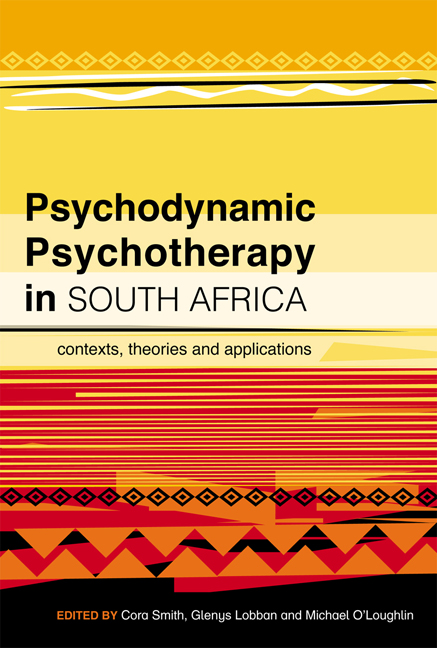Book contents
- Frontmatter
- Contents
- Editors
- Contributors
- Acknowledgements
- Acronyms
- Introduction Cora Smith
- Section I Subjectivity and identity
- Section II Traumatic stress
- Section III Social issues
- Chapter 6 Unconscious meaning and magic: Comparing psychoanalysis and African indigenous healing
- Chapter 7 Intimate partner violence in post-apartheid South Africa: Psychoanalytic insights and dilemmas
- Chapter 8 Serial murder and psychoanalysis in South Africa: Teasing out contextual issues amid intrapsychic phenomena in two case studies
- Chapter 9 Some psychoanalytic reflections on a project working with HIV orphans and their caregivers
- Chapter 10 Reclaiming genealogy, memory and history: The psychodynamic potential for reparative therapy in contemporary South Africa
- Afterword Glenys Lobban and Michael O'Loughlin
- Index
Chapter 10 - Reclaiming genealogy, memory and history: The psychodynamic potential for reparative therapy in contemporary South Africa
from Section III - Social issues
Published online by Cambridge University Press: 21 April 2018
- Frontmatter
- Contents
- Editors
- Contributors
- Acknowledgements
- Acronyms
- Introduction Cora Smith
- Section I Subjectivity and identity
- Section II Traumatic stress
- Section III Social issues
- Chapter 6 Unconscious meaning and magic: Comparing psychoanalysis and African indigenous healing
- Chapter 7 Intimate partner violence in post-apartheid South Africa: Psychoanalytic insights and dilemmas
- Chapter 8 Serial murder and psychoanalysis in South Africa: Teasing out contextual issues amid intrapsychic phenomena in two case studies
- Chapter 9 Some psychoanalytic reflections on a project working with HIV orphans and their caregivers
- Chapter 10 Reclaiming genealogy, memory and history: The psychodynamic potential for reparative therapy in contemporary South Africa
- Afterword Glenys Lobban and Michael O'Loughlin
- Index
Summary
Gone.
Buried.
Covered by the dust of defeat – or so the conquerors believed
But there is nothing that can be hidden from the mind.
Nothing that memory cannot reach or touch or call back
(Don Mattera, 1987, quoted in Delport, 2001a: 31)
The expression ‘Whereof one cannot speak, thereof one cannot stay silent’, which appears as an epigraph on the title page of the work History Beyond Trauma by psychoanalysts Davoine and Gaudilliere (2004), underscores a key theme of this chapter – and indeed of psychoanalysis – that there is much beneath the surface: the silenced, the erased, the unspeakable have ways of making their presence felt. Taken at an individual level, this is a truism of psychoanalytically oriented approaches to clinical practice. However, if individuals are understood as sociohistorically constituted, situated in genealogy and history, ancestrally located, the possibility of life narratives animated by spectral presences, or what Garon (2004) calls ‘skeletons in the closet’, takes on new significance.
I share the concern of Nuttall and Coetzee, and many of the contributors to their book Negotiating the Past: The Making of Memory in South Africa, that ‘the push to forget the past and to look to a new future’ (1998: 1) runs the risk of creating a privileged version of history that will leave stories untold, many citizens severed from their socio-historical and ancestral lineages, and skeletons lurking in the nation's closet. A key thesis of psychoanalysis is that ghostly presences inevitably return in some form, and this revenant (cf. Derrida, 1994) can be highly consequential both for individuals and for societies. The eruption of war in the Balkans in the early 1990s, predicated in part on a resurrection of the humiliation of the Serbian people at the Battle of Kosovo in 1389, serves as a salutary reminder of the longevity and mischief-making capabilities of unacknowledged or suppressed spectres, particularly those that involve some combination of loss, trauma, humiliation and shame. In arguing for a psychoanalysis of the social, I am, therefore, arguing for a psychoanalysis of the spectral.
There is great anxiety in South Africa about reopening the wounds of apartheid. The rhetoric of a ‘rainbow nation’ offers hope for unity and national identity. The problem, as De Kok (1998) reminds us, is that the custody of memory is highly contested.
- Type
- Chapter
- Information
- Psychodynamic Psychotherapy in South Africacontexts, theories and applications, pp. 242 - 272Publisher: Wits University PressPrint publication year: 2013



